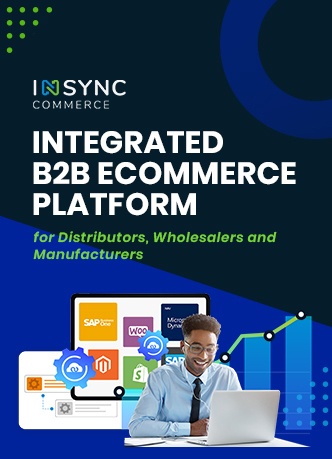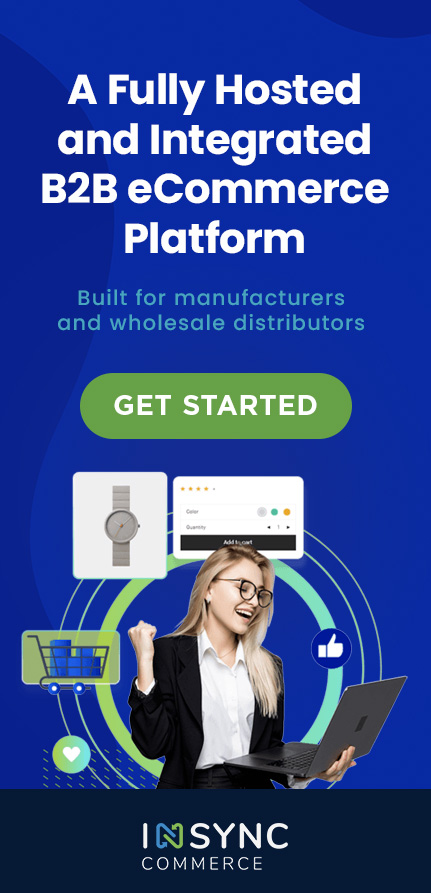
Having a long-term strategic plan has always been associated with improved efficiency and sustainable growth for a business. Thus, companies need to have a sound sales strategy to maintain their business growth. Business strategy planning for a company involves what steps an organization needs to take to achieve its goals, what changes and obstacles to anticipate, and how to utilize existing resources and emerging opportunities to reach the desired outcome.
The same applies to B2B businesses as well. With the demand for B2B buyers increasing consistently and new industry trends emerging every day, B2B businesses need to have a robust sales strategy to stay competitive in the market and succeed.
Why do you need a B2B sales strategy to succeed?
With how lucrative the B2B sales industry is, many companies are either starting as a B2B business or expanding into that marketplace to grow their business. With the increasing competition in the B2B market, companies need to develop a robust long-term sales strategy to stay relevant to their customers.
B2B sales strategy should involve a plan through how an organization can strategically position its business in the market to gain an advantage over the competition. With a proper sales strategy set in place, an organization can develop the most optimized channel to approach its target customers.
The sales strategy acts as a guideline for the organization where to direct its marketing and sales resources and how to communicate its business with the target customers. While a marketing strategy focuses more on increasing the visibility of a company, the sales strategy is what allows a business to bring in revenue. The sales strategy provides the vision and the path for the company in the following way:

Sets a business goal
The sales strategy allows a business to set up a clear plan of what goals are to be achieved, with the goals specifying measurable action items for the sales team to achieve success. Through pre-defined goals, the sales team can get a clear roadmap of the tasks they need to accomplish. Each goal set for the roadmap should be specific, measurable, achievable, relevant to the business, and with a defined period.
Defines the target market
Once the goals are established, the sales strategy helps outline the type of customers the organization needs to focus on for its growth. Identifying the target market allows the business to carve out its niche and stand out in the industry. Not all B2B customers are interested in the same products and industry segment, nor do all B2B businesses cater to every type of customer. Through a sales strategy that focuses on a specific market segment, the business can specialize in that niche, better utilize its resources to cater to that segment, and become dominant in that market.
Supports setting up appropriate business channels
A sales strategy helps determine and develop the channels to sell and promote a business’s product. Through a business channel, the organization can ensure that every team member understands which platforms to use and how to use them to approach its customers. It defines what role each member of the sales team plays and what sales behavior are required from them by the company. With the fixed business channel provided by the sales strategy, any form of confusion or miscommunication gets removed and allows every team member to precisely understand what regular sales operations they should focus on to achieve the desired sales goal.
Provides an understanding of the competition
A proper sales strategy provides insight into the competitors of the business. It clearly outlines what tactics the competitors are using, which of those are working, and where the competitors are falling behind. With proper insights into the competitors provided by the sales strategy, businesses can develop an aggressive pricing model and marketing strategy to gain an edge over the competitors. Moreover, by addressing the drawbacks of the competition, the company can pull in the competitor’s customers as well.
Establishes accountability
The key benefit to a sales strategy is creating an environment of accountability and integrating it into the business workflow. The set guidelines of a sales strategy ensure the sales team accomplishes the required goals within the required period. The accountability provided by a sales strategy also helps team members gain the necessary skills and knowledge to be more effective and successful.
While a sales strategy can provide all these advantages to a business, how effective it is, depends on its implementation. So, while an organization may have a sound sales strategy planned out, poor execution of it may result in it not working towards the business’s success.

Why is your current B2B sales strategy not working towards the growth of your business?
Even with a proper sales strategy implemented, circumstances may arise when it does not provide the desired outcome. No matter how good a B2B sales strategy may be, there will always come a point when the strategy hits a plateau. The depreciative effect of the sales plan leads to limited sales or loss of initial business momentum. So, if a sales strategy is not working, it could be because of the following reasons.
Poor product value proposition
Providing value to the customer is the fundamental element of a successful sales strategy. No matter how well presented a sales process is, the item on offer must provide the customers with something they need or want at a price point they evaluate to be reasonable. So, the product on sale for the customer during the B2B sales process needs to be an item that is in demand and reasonably priced.
Lead nurturing is lacking
Appropriate lead nurturing with a robust customer journey experience is a crucial factor to keep in consideration for a successful sale strategy. A lead that does not close on the first interaction is not a dead lead. Moreover, soft leads that are not currently ready to adopt the product or are not as interested as the hotter leads should not get abandoned by the sales team. Just because a lead is not currently interested does not mean that future trends and demands will not create a new interest for them. Nurturing soft leads through effective marketing strategies can generate new interest in them and bring them to a close.
Subpar eCommerce platform experience
B2B eCommerce is the future. Most B2B customers now want to conduct their purchases online. A report shows that the global B2B eCommerce market size was valued at USD 6.64 trillion in 2020 and is estimated to grow exponentially in the following years. With millennials becoming the core demography of B2B buyers, the preference for B2B buyers is shifting towards conducting purchases through online stores. With the majority of B2B customers preferring online purchases, it is of utmost importance that they receive a secure, fast, and intuitive platform to conduct their purchases. So, if the business does not have an eCommerce platform or has one with poor customer experience, then even the most robust sales strategies will fail to bring in sales.
Non-replicable sales process
A sales strategy needs to be replicable for different circumstances. The process needs to be consistent and repeatable for the sales team to write impactful sales proposals, do it with appropriate brand identity, offer sales proposals on relatively even footing with each other, and evaluate sales processes that worked or did not work under multiple independent sales scenarios. Only through a repeatable sales strategy can an organization bring in perpetual sales.
Now that we have outlined the probable reasons your B2B sales strategy is not working towards the growth of your business, let us look at what tactics you can implement to make a B2B sales strategy that brings you success.

Strategies to implement a successful B2B sales strategy
By periodically updating your B2B sales strategy, you can prevent your sales approach from becoming stagnant. Regular changes to B2B sales have become significantly more essential with a shift towards digital sales and a more hands-on customer journey-oriented sales process. Thus, to have a successful B2B sales strategy in this new customer-focused and digitally driven sales environment, businesses need to implement the following principles into their sales strategies.
Conduct in-depth market research
Researching both the market and customer is necessary before plotting a proper sales strategy. Before the sales team approaches the leads, the lead quality can be evaluated through thorough research of the lead’s websites and social media profiles. The analysis can provide details of the lead’s pain points, challenges, goals, and even the estimated budget. With all this information, the sales team can curate a more personalized presentation that addresses all the requirements of the lead and thus increase the chances of closing the deal.
Work on improving online customer experience
As we have already established, B2B customers today are shifting towards online platforms to carry out their purchases. So, if the customers find their overall online experience to be average or sub-par, they will move to a different vendor that provides a better digital experience. The poor online experience can deter new customers and make existing customers choose a separate vendor due to continued poor online service. Thus, to have a successful sales strategy in this digital era investing in a robust, secure, and user-friendly eCommerce platform is mandatory.
Equip sales team with product and industry knowledge
With the sales team being the first point of contact for the lead during the customer’s success journey, the sales team must have a thorough understanding of the company’s product and actionable insight into the customer. There should be a clear understanding within the sales team regarding the product’s features and functions, as well as how the product is beneficial to the customer. Proper documentation of the product along with data on the prospects through intensive customer research, provides the sales team with the necessary tools to the sales team to tailor their conversations to each customer and adapt their sales pitch to fit the unique needs of the customer.
Implement automation and other technologies
Automation has become a core pillar for the effective functioning of organizations in the industry. It is not always possible to have a dedicated individual to manage every lead around the clock. By introducing automation within the lead management and nurturing workflow, the organization can reduce the required workforce, streamline the process, and provide a more satisfactory customer experience. By adopting automation and other technologies, the organization can optimize the effectiveness of its sales strategy.
Focus on building long-term customer relationships
For B2B sales, the quality of the relationship the organization maintains with its customers can make or break the business. The quality of relationship maintained extends to not only existing customers but also possible customers or soft leads as well. Focusing on building and maintaining relationships in B2B sales is far more important than closing deals. Pressurizing a customer to make the purchase can drive them away and leave them with a poor experience. But by focusing on nurturing a relationship, the customer may become interested in closing a deal in the future or even recommend someone else to buy from the company. Thus, the prospects can become a channel for word-of-mouth marketing if the company upholds a high-quality relationship with them.
While there will always remain room for improvement, the above strategies are industry-tested techniques that you can implement into your sales strategy to attract new B2B customers and develop a loyal customer base.
Expand the capabilities of your B2B sales strategy with INSYNC Commerce
In the modern digital age, no matter how well planned your sales strategy may be, without a robust eCommerce platform, you will be losing out on the larger demography of B2B customers that prefer making their purchases online. With the robust end-to-end integrated B2B eCommerce platform of INSYNC Commerce, you can now seamlessly and effortlessly upgrade your eCommerce experience for your customers. INSYNC Commerce provides you with a powerful PWA-powered platform with a responsive and customizable webstore that comes with a secure SSL certification and unlimited bandwidth for products and sales to ensure the perpetual growth of your business. To learn more about INSYNC Commerce in details head on here!













